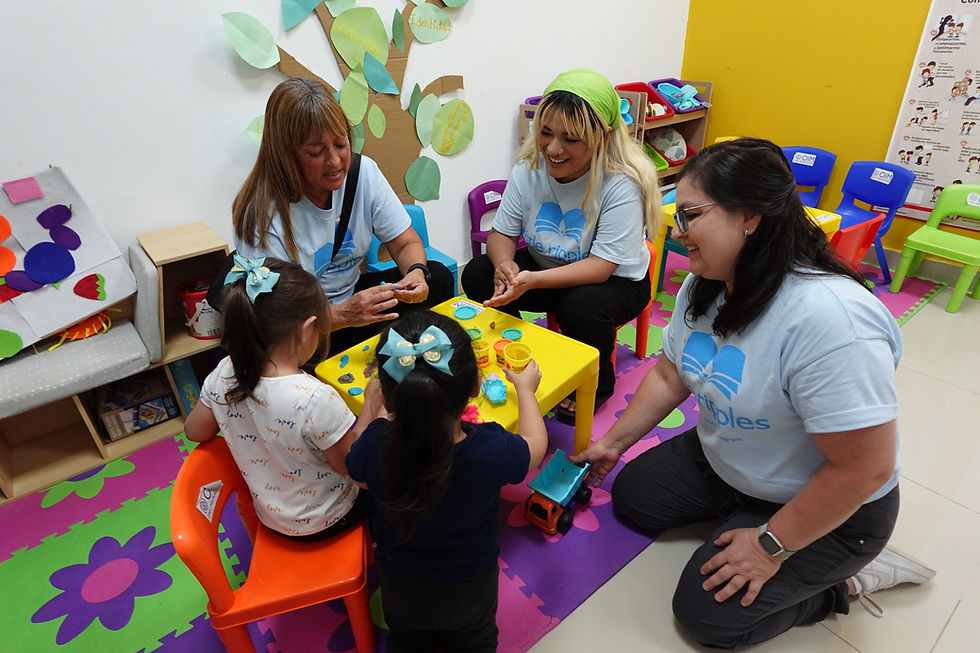Empathy Can End Mass Atrocities, Part I: How early childhood education creates a generation of empat
- Katie-Jay Scott
- Jul 26, 2017
- 4 min read
Updated: Mar 1, 2024
Part of a three-part blog series by iACT Chief Operating Officer Katie-Jay Scott on the power of empathy to address trauma and empower people affected by mass-atrocities. Read Part II: Creating Change through the Global Sports Community
iACT believes that as we foster personal connections between survivors of mass atrocities and those who are willing to open their hearts and help, we change the way the world responds to mass atrocities. iACT does this with all ages: from preschool to high school to college and to community and faith-based groups. The empathy fostered through authentic and diverse campaigns and educational programs is at the heart of our work.
A further goal, of course is to eliminate atrocity in the first place. We ask “How can iACT foster empathy so that future generations prevent mass atrocities before they occur? The world, of course, needs policies and tools at both the international and national government levels. We also need our leaders working in global and state institutions to lead with empathy; empathy which can be fostered at the youngest of ages.

Little Ripples is iACT’s early childhood development program. Led by refugee women, it uses empathy to foster peacebuilding, celebrate diversity, and strengthen the foundation of nonviolent communication. iACT believes that through supporting cognitive and social-emotional learning rooted in empathy, communities can break out of the cycle of violence endemic to refugee populations.
The future of refugee children will be shaped by their experiences in camps or settlements. And while investments in early childhood have been found to be one of the most cost-effective strategies for improving the long-term economic, physical, and social well-being of both the child and his or her community, there are no globally sustained or prioritized innovative solutions for this vulnerable age group. Consequently, generations of children continue to be at risk of irreversible long-term damage.
Eighty-five percent of brain development occurs before the age of five, including the foundations for continuing social, emotional, cognitive, and physical development. During this time, key characteristics such as curiosity, social dexterity, and socialization develop. The impact of exposure to traumatic events can produce high levels of stress for the child, damaging the brain and severely impeding development well into adulthood. Further, the development of children is influenced by the care they receive from their families. In refugee contexts, adults also suffer greatly and must focus on daily survival activities, such as collecting food rations and looking for work, impeding their ability to provide developmental support for their young children.
Little Ripples addresses the gap in humanitarian aid for ages three to five and empowers young women ages 18 to 25 to be part of the solution in their communities and for their futures. It fosters empathy among women and children from various tribes, all while offering tools for peace and a global connection between communities.
To strengthen that global connection, iACT has created the Little Ripples Global Citizens (GC) program, a US-based preschool curriculum that connects children ages three to five with their peers living in refugee camps, through empathy-based and developmentally appropriate tools, activities, and resources that promote nationally-recognized preschool learning foundations. The program fosters connection and empathy, and creates the foundation for global ambassadorship at the earliest stages of development in the next generation.
Global Citizens was created to meet requests by preschool and kindergarten teachers in the US who wanted their children to connect with children attending Little Ripples. After learning about the success of Little Ripples, the U.S. teachers knew it could impact the lives of their students, but needed a curriculum and packaged resources to effectively create the global connection.
GC is a 20 lesson curriculum grounded in the four C’s—critical thinking and problem solving, communication, collaboration, and creativity & innovation—that seeks to plant the seeds of empathy, compassion, and interdependency. The curriculum can be used with and tailored to a diversity of preschool philosophies. Each day, the program begins with simple mindfulness and breathing exercises that Little Ripples students also participate in. Just as Little Ripples utilizes play-based and student-driven components, so does GC. Additionally, each daily lesson includes an objective, resources, and activities that teach students about themselves and the life of their refugee peers, while engaging in social-emotional development, language and literacy, language development (can be tailored to dual-immersion language programs), mathematics, science, performing arts, physical development, health, history/social science, and science. GC is a safe way US children to share the joys of participation, cultural ambassadorship, and empathy-based living at the earliest stages of child development.
Young leaders at My Escuelita: Spanish for Kids in Redondo Beach and The Oaks School in Los Angeles, CA have already organized lemonade stands and equipment drives and made books and art projects that are now part of Little Ripples in refugee camps. The global connection created between students of Little Ripples and Global Citizens fosters both awareness and empathy in leaders who will one day lead their communities, countries, and international organizations on both sides of the world.



